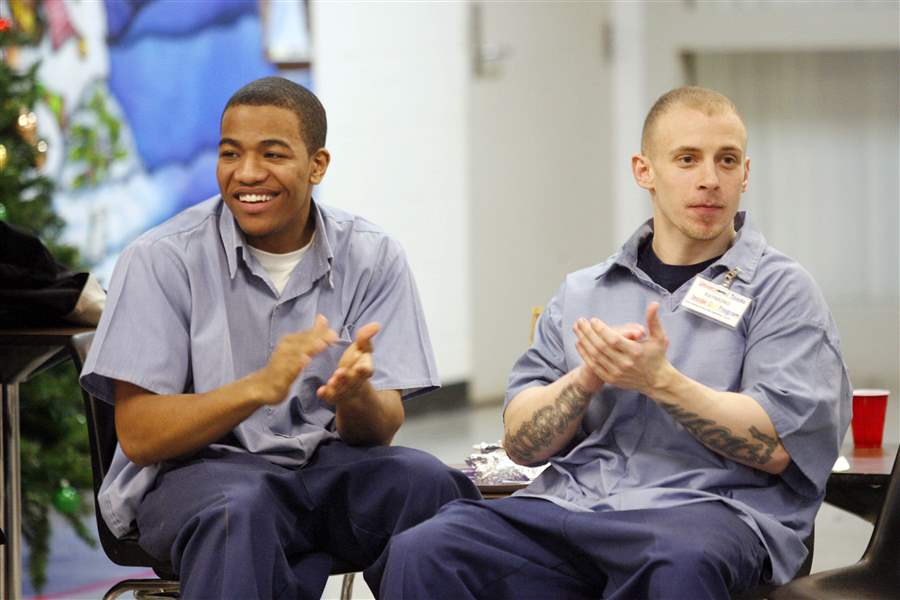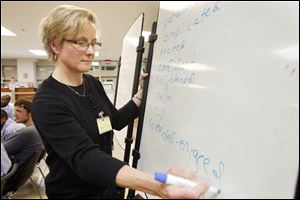
Study program pairs inmates, UT students
12/12/2010
Shannon, left, and Raymond applaud a comment. This is UT's first offering of the program, which has been embraced by other Ohio colleges, including Xavier, the College of Wooster, Ohio University, and Ohio State.
The Blade/Amy E. Voigt
Buy This Image
There was nervous laughter and escalating chatter as high-profile visitors to a college course held at the Toledo Correctional Institution were asked an unexpected question: "If you were an animal, what would you be?"
With students in a small inside circle facing their visitors in a larger outside circle, a 22-year-old man in prison blues prodded Warden Kevin Smith. He was slow to answer.
"From the obvious standpoint, you'd want to be something that is in charge of something, that's fearless," the prisoner, Shannon, said.
An eagle, the warden conceded, because it owns the sky. A three-toed sloth, the prisoner said of himself, "Because they're in the jungle and all they do is hang out in trees all day. There's a lot of rough stuff, panthers and stuff. And I'm just sitting up there, far away. They're not into that stuff."
This was the community's first glimpse of the Inside-Out Prison Exchange Program — a course that introduces prisoners and college students as equals in the classroom to discuss social and political topics for university credit. The first program of its kind in northwest Ohio, the idea started at Temple University in 2002. Now, several colleges in Ohio have embraced the concept, including Xavier University, the College of Wooster, Ohio University, and Ohio State University.
Before the conclusion last week of the inaugural class hosted by the University of Toledo at the Toledo Correctional Institution, community officials were invited to participate in the course.
Inside-Out instructors prefer to be called "facilitators" rather than professors, because they start the class with ice-breaker exercises to spark talking and laughing before student-led discussion begins. Lucas County Assistant Prosecutor Dean Mandros and University of Toledo Interim Dean of Students Michele Martinez were among the civic leaders, university administrators, and prison personnel to participate in the final session Tuesday that started with questions such as, "What is your most embarrassing moment?" and "How would you like to improve yourself?"
After the exercise, participants sat in a circle and were asked how the exercise made them feel. Answers ranged from anxious and overwhelmed to comfortable and enlightened.
"When you came in, it was awkward, the suits, you know," Joshua, a prisoner, told the group. "But I learned that we have some funny stories in common."

Renee Heberle, a UT facilitator, writes reactions from participants in the last day of class for the Inside-Out program at the Toledo Correctional Institution, where students and prisoners discuss social and political topics.
Prior to the session last week, University of Toledo students and inmates at the Toledo Correctional Institution sat in alternating seats, munching on food from Chipotle and chatting comfortably. There were outbursts of laughter, and sometimes whispered inside jokes between the predominantly female students and male prisoners — a relaxed, friendly atmosphere that felt more like a college dorm than prison lockup.
Though participants are encouraged to engage in candid conversation about class topics, friendships between inmates and students are forbidden outside the classroom. Attempting to visit outside of class time or passing notes during the session would be cause for permanent expulsion from the class, a national rule imposed by the Inside-Out program.
"There is that boundary because an offender could try to ask them to bring contraband in — money, postage stamps, food," Meredith Rinna, the warden's assistant, said.
Their interaction is strictly first names only, a concept "kind of unheard of in corrections," Susan Brown, deputy warden of special services at Toledo Correctional Institution, said. Typically, prison staff members use only an inmate's last name to keep a professional distance from them.
Because both sides are basically anonymous, college students have no idea whether the person sitting next to them has committed murder, rape, or robbery. The Blade is identifying Inside-Out participants by first name only in order to preserve the integrity of the relationships between the students and the prisoners, who will remain in contact through an alumni group. Their first alumni project will be to create an agricultural program at the prison.
Liz, a University of Toledo senior majoring in political science, said she isn't curious about the crimes that resulted in her classmates' imprisonment. The experience left her reconsidering law school, in favor of furthering her education to teach in the prison system.
"All I see are people, and all I see are great people," Liz said. "And I don't want to ask that, I don't want to know. You don't have to know someone's past to know them."

Shannon, left, and Raymond applaud a comment. This is UT's first offering of the program, which has been embraced by other Ohio colleges, including Xavier, the College of Wooster, Ohio University, and Ohio State.
By limiting access that students and prisoners have to each others' lives outside the classroom, dialogue cannot be influenced by fear or judgment of a prisoner's criminal past, said Renee Heberle, a University of Toledo professor of political science who facilitates the course with Morris Jenkins, a professor of criminal justice.
"Preserving the anonymity is key," Ms. Heberle said. "I think it's been about developing a comfort level, and now they are engaging each other socially, politically."
Inside-Out courses in English and history are planned for next year.
About 30 class participants were selected for the Inside Out program after interviews with educators and prison staff. Inmates were required to have a high school diploma or equivalent, a record of good behavior at the facility, and to commit to complete the class assignments.
At least 200 inmates applied for 15 spots in the class, though one of them was forced to drop out after a behavioral problem unrelated to the course.
"Usually we start with 15 guys and end up with four or five," Ms. Brown, deputy warden, said. "They've kept their word. They've been on time for class and done the work."
The experience seems to be a positive one for both inmates and students, she added.
"I think it gives the students insight," Ms. Brown said. "It's probably going to help the students break down stereotypes of prison life."
Participants researched issues of social justice in small groups and read several articles about the American system of crime and punishment before class discussion.
Jamill, a 47-year-old prisoner, worked in his group on a project about death row. After weeks of research, the group performed a skit in which misconceptions about prisoners and prison life were spoken and the reality demonstrated with silent action. The course was challenging 27 years after his own college graduation because, he said, "I forgot how to write my papers."
"It was very interesting to see the outside students be very welcoming to those incarcerated," Jamill said. "You see the individuality and the best aspects of a person come out."
Before the conclusion of the course, a prisoner sang and performed a love song on the keyboard, and a college student read a poem about the flaws of the prison system.
Brandi, a University of Toledo political science major, sat laughing beside a prisoner, Cory, after the performances.
"Throughout the whole semester, we've all gotten close. We see each other as students," she said.
Contact Bridget Tharp at: btharp@theblade.com, or 419-724-6086.